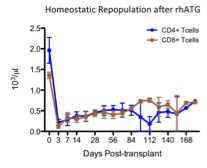Depletional Induction Therapy in Non-Human Primates – Preclinical Modeling of Polyclonal Depletion with Rhesus-Specific ATG
1Surgery, Duke University Medical Center, Durham, NC, 2University of Massachusetts Medical School, Boston, MA
Meeting: 2019 American Transplant Congress
Abstract number: A16
Keywords: FACS analysis, Induction therapy, Kidney transplantation, T cells
Session Information
Session Name: Poster Session A: Acute Rejection
Session Type: Poster Session
Date: Saturday, June 1, 2019
Session Time: 5:30pm-7:30pm
 Presentation Time: 5:30pm-7:30pm
Presentation Time: 5:30pm-7:30pm
Location: Hall C & D
*Purpose: Antithymocyte globulins (ATG) have been used in transplantation since the late 1960s to prevent and treat acute allograft rejection. Over the past decade, induction therapy has become particularly common in renal transplantation with approximately 70% of clinical cases utilizing induction therapy. Rabbit ATG (RATG; Thymoglobulin®) is the most commonly used formula for depletional induction therapy in the US. Although lymphocyte depletion is the most evident effect of RATG, polyclonal antibodies influence numerous target antigens influencing adhesion, costimulation and many other biological processes. Non-human primate (NHP) research is a crucial translational model for transplantation, and though RATG has an in vivo effect in NHPs, it differs in many key ways from its effect in humans. To better model the use of RATG in translational NHP transplantation, a rhesus-specific ATG (rhATG) was developed and tested.
*Methods: We compared our experience with rhATG in sensitized and non-sensitized NHP renal allotransplant models to therapy with monoclonal anti-CD4, CD8 and CD20 depletion. We analyzed peripheral blood mononuclear cells by flow cytometry.
*Results: The effects of rhATG were consistent with the known effects of RATG used in humans: significant depletion of CD4+ (89%, p<0.005) and CD8+ T cells (92%, p<0.0001), repopulation leading to a characteristic CD4/CD8 inversion (Figure 1), and prolonged (>6 months), modest CD4 dominant lymphopenia (24% of baseline, p<0.05). B cell depletion was not evident. Induction therapy with monoclonal anti-CD4 and CD8 was more profound, long lasting and particularly CD8 dominant. Monoclonal depletion caused significant CMV reactivation that exceeded that seen with rhATG.
*Conclusions: We have demonstrated a depletional profile of rhATG that better mimics the therapeutic effect and side effect profile of RATG in humans than other experimental monoclonal depleting antibodies. We conclude that rhATG is a valuable reagent that will facilitate pre-clinical modeling of RATG use in NHP transplant models.
To cite this abstract in AMA style:
Schmitz R, Mulvihill MS, Schroder PM, Fitch Z, Leopardi F, Magnani D, Kwun J, Knechtle SJ, Kirk AD. Depletional Induction Therapy in Non-Human Primates – Preclinical Modeling of Polyclonal Depletion with Rhesus-Specific ATG [abstract]. Am J Transplant. 2019; 19 (suppl 3). https://atcmeetingabstracts.com/abstract/depletional-induction-therapy-in-non-human-primates-preclinical-modeling-of-polyclonal-depletion-with-rhesus-specific-atg/. Accessed February 22, 2026.« Back to 2019 American Transplant Congress

